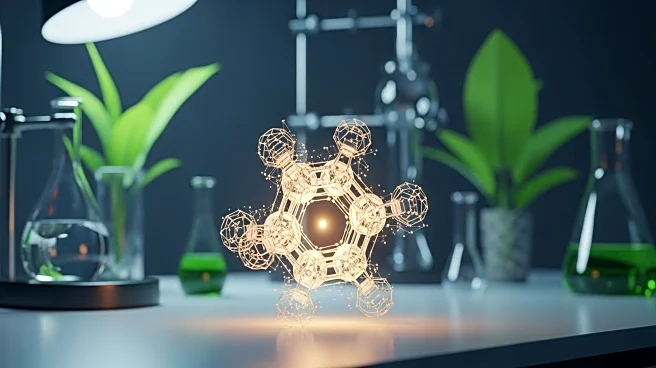What's Happening?
Researchers are exploring biohybrid technologies to make chemical manufacturing more sustainable. A team led by Dr. Yong Jiang has highlighted biohybrid synthesis systems that integrate living cells with advanced materials to produce chemicals cleanly. These systems use energy sources like electricity and sunlight to activate materials that transfer electrons to microbial cells, catalyzing the production of chemicals from carbon dioxide and water. Recent advancements include solar-powered semi-artificial photosynthesis and microbial electrosynthesis, which convert CO2 into valuable products under mild conditions. The research also discusses semi-artificial photosynthetic systems that use semiconductor materials to channel solar energy efficiently, paving the way for scalable production of chemicals directly from sunlight and captured carbon.
Why It's Important?
The development of biohybrid technologies is significant as it addresses the growing demand for sustainable chemical manufacturing amid climate challenges. By leveraging renewable energy and biological processes, these technologies offer a path to cleaner production methods, potentially reducing the environmental impact of chemical synthesis. The ability to convert waste carbon into useful products could contribute to achieving net-zero emissions in the chemical industry. This approach not only supports environmental protection but also opens new avenues for wastewater treatment and soil carbon capture, enhancing resilience against climate change.
What's Next?
Future research will focus on optimizing electron and energy transfer between materials and microbes, and engineering microbial systems for broader product diversity. The authors suggest exploring more sustainable energy sources, such as magnetic and thermal inputs, to further enhance biohybrid systems. These advancements could lead to self-powered systems capable of operating in diverse environments, providing innovative solutions for environmental remediation.
Beyond the Headlines
Biohybrid technologies could trigger long-term shifts in chemical manufacturing, promoting a transition towards more sustainable practices. The integration of biological and material sciences may lead to ethical considerations regarding the use of living cells in industrial processes. Additionally, the development of self-powered systems could influence regulatory frameworks and industry standards, necessitating new policies to ensure safe and responsible implementation.









